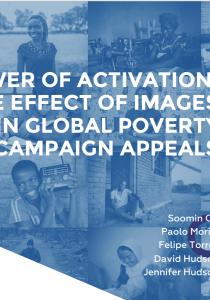
As the UK government announces a near £3 billion cut to the aid budget in line with the shrinking economy and the 0.7% commitment, the aid sector finds itself suddenly crushed under the aid target it has for so long championed. But what do the British public think of 0.7%? We compared new data with public opinion from 2015 to understand how these cuts align with the British mood about 0.7%. The comparison raises a tough question: It’s easy for a beleaguered government to support 0.7% when it dictates cuts, but when the economy bounces back, will it bring a fight over the 0.7% law with it?
Since the 0.7% aid target became legally binding for governments in 2015 with the introduction of the International Development (Official Development Assistance Target) Act, support for 0.7% has not deteriorated, new data from the Development Engagement Lab reveals. But the way the case is made for 0.7% is changing, with some arguments now falling flat. And it’s clear – both to the public and the aid sector – that criticism of the government’s latest cuts is also a criticism of the 0.7% target: is it time for the sector to update its case for aid ahead of a more difficult debate?
We tested the resonance of the four main arguments for 0.7% with a survey of the British public on 14 May - 4 June 2015, asking whether 0.7% was the right (or wrong) thing to do, whether it was in the national interest, whether it would help save lives, and if it represented value for money. On 10 July − 12 July 2020, we repeated the survey, in light of Boris Johnson’s decision to merge DFID with the FCO, creating the new Foreign, Commonwealth and Development. With this merger, Johnson also recommitted his support for the 0.7 target.
How have attitudes towards 0.7% changed over the past five years? We look at each frame below. Figure 1 shows the comparison of attitudes from 2015 and 2020.
How 0.7% frames emerged
Attitudes toward the 0.7% target – like so much else in society – have become more polarised, with much of the change in attitudes shifting from an ‘on the fence’ middle to either side of the spectrum of support. Our research also shows that, despite a decade of Conservative governments framing UK aid in the national interest, the British public are increasingly rejecting this argument. And, this sits alongside a growing percentage of the public who disagree that UK aid is ‘good value for money.’
The strongest argument for UK aid is still that aid ‘will help save lives.’ This has not changed from 2015-2020.
The idea for 0.7 first emerged not as an advocacy or campaign idea, but as a back of the envelope calculation in preparation for a UN meeting. Embraced by a Conservative-led UK government, it became an advocacy target – held up as the crown-jewel of cross-party consensus. All the more extraordinary was the context of its birth: the UK was deep in austerity, with spending cuts rife across government, save for the ring-fenced National Health Service and the aid budget.
Saves lives – Still a strong case
The political case for 0.7 was clear. Key players in the Conservative Party took early ownership over the target, and recognised it as a valuable tool for detoxifying the Conservative Party brand. A Private Members’ Bill sponsored by a Liberal Democrat was supported by the Coalition Government and travelled through the Houses of Parliament bolstered by strong bipartisanship. It was here the first messaging around 0.7% was crafted, with the tagline that followed the bill through Parliament: “Turn up, Save Lives.”
In terms of saving lives, the levels of agreement and disagreement have not changed since 2015. Here 45% agree while only 17% disagree.
The strongest argument for UK aid for the British public is that aid ‘will help save lives.’ This has not changed from 2015-2020. Across DEL data, we find that the British public want UK aid used primarily to help the world’s poorest: altruistic reasons for giving aid are far more compelling than aid in the national interest.
Right/wrong thing to do
In 2012, Justine Greening, Secretary of State for International Development, said: ‘Achieving our pledge of 0.7% is the right thing to do and the smart thing to do. It is in everyone's interests for countries around the world to be stable and secure, to have educated and healthy populations, and to have growing economies.’ The government’s commitment to UK aid in the national interest was spelled out in a 2015 paper, arguing that while UK aid has made significant contributions to reducing childhood mortality, improving access to education, and providing clean water, hygiene and sanitation, aid has remained controversial “at home, because people want to know that it is squarely in the UK’s national interest”.
On balance, the public is still more likely to agree than disagree that giving 0.7% is the right thing to do. But compared to 2015, fewer people believe it’s the right thing to do. Likewise, more people now believe it’s the wrong thing to do (29% in 2020, up 6%).
Positions on both sides have also hardened. The overall level of agreement is the same in 2020 as in 2015, with around 4 in 10 people agreeing that the 0.7% target is the right thing to do. But within this, the percentage of people saying that they ‘strongly agree’ has gone from 11% to 18%. On the other side, the proportion of the population who say that they disagree has gone from 2 in 10 in 2015 to 3 in 10 in 2020, an increase of 50%. So, like with other frames, views are hardening on both sides and being squeezed in the middle.
National interest – losing support
The statement that The UK's commitment to spend 0.7% of national income on overseas aid is in the national interest is in the balance. This is in contrast to the argument that it will help save lives – which the public supports much more. Our previous research also shows that altruistic reasons are much more compelling to the public than those couched in the national interest.
In terms of the national interest, 37% of respondents agreed with the statement in 2015, and 33% agreed in 2020. The shift is reflected on the other side as well: 23% disagreed in 2015 that 0.7 is in the national interest, compared to 32% in 2020.
Good value for money – never quite hitting the mark
Since 2011, DFID has maintained an explicit approach to ensuring value for money. A recent ICAI report into DFID’s efforts to establish itself as a global champion on value for money was broadly positive, but noted that ‘against the background of the 0.7% aid spending commitment, the pledge to achieve 100 pence of value for every pound of aid spent has become central to the political case for the aid programme’. This has enabled critics who have argued that the ‘rush’ to spend money before the end of the financial year risks wasting money.
But the argument that aid is good value for money wasn’t a winner with the public in 2015 and isn’t a winner in 2020. Talking about the value or return on investment from aid doesn’t land with the British public. We’ve documented this in our other work across the sector, which shows that the discussion of sums of money tend to bristle with the public. Regardless of the relative size of the aid expenditure – say, for example, shown in a comparison with other countries – the public inevitably asks to see it cut. With this in mind, it’s in fact surprising that the public, who so consistently resist arguments about large sums of cash, have embraced the 0.7 discourse for so long.
Looking ahead, beyond a COVID-19 recession to a rebounding British economy, it’s important for aid organisations to think about how and whether they hope to continue advocating for 0.7%. If indeed the government intends to go after the law enshrining 0.7%, it’s possible they will use the sector’s reactions to this week’s £3 billion in cuts as fodder against the aid target. The sector knows too-well already the downsides of 0.7% – a reflection of the problems of institutional aid more broadly – so now is the time to think long-term about what strategies are in the interests of better, more sustainable and consistent development and humanitarian aid.





































